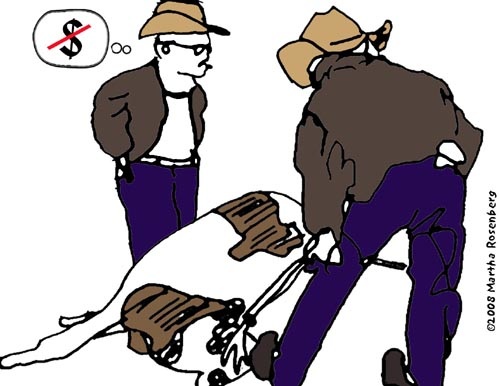Did people just discover where meat comes from? Sometimes it seems like it.
Animal rights activists, with the help of miniaturized cameras and the Web, have forced farm animal treatment onto the national front page with a parade of cruel, upsetting and gruesome exposes. To capture the farm verite all they often have to do is get hired at a factory farm or slaughterhouse.
How hard is it to get hired in a slaughterhouse or on factory farm? Can you fog a mirror? Can you start this afternoon? There is not a long line to fill jobs whose descriptions are, "Remove dead animals from 98 degree ammonia-infused pens wearing face mask, $8 an hour possible, depending on experience," or "Determine sex of newborn chicks and grind up unwanted males for dog food: $6 dollars an hour; chance for advancement."
Many farmers and ag professionals are miffed that the days of "it's-none-of-your-business" farming are over. Once upon a time, consumers cared only about price and wholesomeness of food and didn't worry about -- or investigate -- its origins and "disassembly."
Today consumers want to know how an animal lived, died, and even what it ate in between -- and think it is their business. Some of the newly engaged consumers are motivated by health, wanting to avoid hormones in milk, antibiotics in beef, arsenic in chicken and who know what in seafood. But most are motivated by what meat producers would call sentimentalizing animals -- not wanting them to suffer and die.
When food producers are caught red-handed abusing their animals on video, their defenses are often over the top. "That's not our farm," they claim," and even if it is, those are not abusive practices and even if they are abusive practices, the employees were put up to it by the activists, and even if they weren't put up to it, there were only a few bad apples and we've fired them and even if there were a few bad apples, why did the activists tolerate the abuse and not report it to us and even if they did report the abuse to us, these people have a vegetarian agenda and want everyone to give up meat!"

Some abuse that undercover employees document can be explained by ignorance, cost margins at volume operations that make it cheaper to kill animals than treat their illnesses, and the frustration of degrading, low-paying jobs that seem to be made more difficult by the animals themselves. ("You'll learn to hate them," the mechanic training an undercover animal rights activist says of the cows.) But other operations seem to harbor employees who enjoy and seek to hurt animals.
Revelations of cruelty on U.S. farms often have immediate, "viral" results. Customers of the operation sometimes suspend their business, consumers may boycott products, and politicians have even introduced legislation to stop exposed cruel practices. Yet prosecuting attorneys almost never bring charges because the victims are just animals and farm animals to boot. Prosecuting attorneys even say they will launch "their own" investigations as if the farm operations would not have been subsequently cleaned up after exposing videos.
Now, Agribiz is attempting to make the depiction of factory farm conditions a crime with "ag gag" bills that clearly violate the First Amendment. Rather than criminalizing undercover animal rights activists who document abuse, meat producers, government regulators, and food consumers need to contemplate the ethics of a system of production that has become so cheap there is no room for the welfare of the animals in the equation. As the activists say, "Are you really that hungry?"